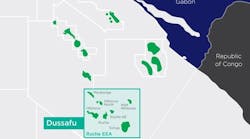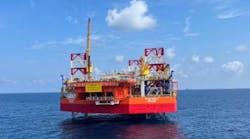Offshore staff
LONDON – Westwood Global Energy Group has analyzed how the Jubilee oil discovery offshore Ghana has influenced frontier drilling in the deepwater Central Atlantic margins.
Since 2007, various operators have targeted potential analogues from Mauritania to Cameroon along the West Africa margin and fromGuyana to northeast Brazil in South America, according to Jamie Collard, analyst, Global Exploration Research.
However, only a few companies have had major successes with these plays. The main lesson, Collard claimed, is the imperative of first understanding the geological factors that are needed in order to replicateJubilee-type results.
Westwood’s new report, ‘Jubilee to Liza, The Keys to Unlocking Commercial Success,’ has found that between 2007 and early 2018, 78 companies spent $11.4 billion on this quest, drilling 128 exploration wells across 13 basins along the Atlantic margins.
Sixty-one wells were drilled at the frontier stage of exploration, prior to the first commercial discovery being made in a basin.
Frontier exploration delivered four commercial basin-opening discoveries with a commercial success rate of 7% and a technical success rate of 39%, with 6.5 Bbbl of oil and 41 tcf of gas proven in the Tano, MSGBC, Sergipe-Alagoas, and Suriname-Guyana basins.
Nine of the companies participating in the frontier finds captured 74% of the total volumes.
The keys to unlocking commercial success in the Cretaceous plays of the Central Atlantic margins, Collard said, are participating early in the opening of a new province, being selective, learning quickly the key geological elements needed for success, and integration of geological and geophysical analysis.
Of the wells drilled so far, 80% have targeted slope areas of the margins. Much of the commercial resources in the slope setting are in areas dominated by normal faulting with gentle slopes, where higher quality deepwater reservoir sands can be deposited and there are optimal conditions for hydrocarbon migration.
Success rates are lower on steeper, narrow slopes where deepwater sands are more confined and traps are smaller.
Potentially significant resources remain to be discovered on the margin slopes and there is an increased focus on the ultra-deepwater basin floor settings that have a proven high potential, but have been tested by only a few wells to date.
03/20/2018





